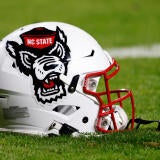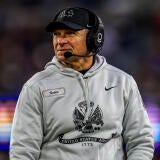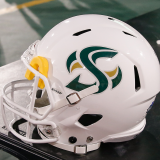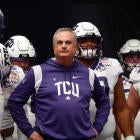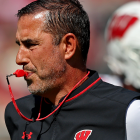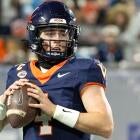What happened to TCU? Examining the Horned Frogs' post-title game slide, what the future holds in Fort Worth
Life has moved too fast for TCU after its shot at glory, with the Horned Frogs going a historically-bad 8-10 since opening the 2023 season as national champion runners-up

It was only 19 months ago when TCU, just two decades removed from being a member of the Western Athletic Conference, knocked off Michigan to reach the national championship game.
Sonny Dykes could do no wrong at that time. Even though the Horned Frogs were walloped by Georgia, 65-7, the future seemed incredibly bright. Dykes was just getting started and TCU, sitting on a bevy of recruiting talent in the Dallas-Fort Worth metroplex, would soon be in position to occupy the catbird's seat in the new-look Big 12, which would soon see Oklahoma and Texas depart for the SEC.
That momentum is gone.
TCU is 8-10 since the start of the 2023 season -- the worst record in the first 18 games of any team that finished in the top two of the AP Top 25 since 1966. The Horned Frogs, which had a bye last week, most recently lost 30-19 to Houston, a team that had scored 12 total points against Power Four competition coming into that matchup.
Whether that's rock bottom for TCU (3-3, 1-2 Big 12) remains to be seen. But heading into the Horned Frogs' game this weekend with Utah (10:30 p.m. ET., ESPN), it's worth considering what's gone wrong for the program. And more importantly, is there any room for optimism moving forward?
A one-dimensional offense
Let's start here: TCU's offense isn't bad. It ranks 46th nationally in yards per play, 25th nationally in points per game, 38th in offensive EPA and 25th in offensive success rate. Not elite, but certainly above average. So, what's the problem for that unit?
It's two-fold:
- TCU can't run the ball.
- TCU is turning the ball over way too much.
The run game is horrid. The Horned Frogs throw the ball 58% of the time. The coordinators are different (Garrett Riley in 2022 and Kendal Briles in 2024), but it's worth noting that TCU had a 55-45 run-pass split back in 2022. That balance is gone.
It's understandable why Briles is operating his offense in that way. TCU has great receivers -- Jack Bech, JP Richardson, Savion Williams and Eric McAlister might be the best quartet in the Big 12 -- and a very good quarterback in Josh Hoover. It's the running game that's inefficient.
TCU is averaging just 3.2 yards per carry as a team, which ranks 118th nationally, and neither of the team's top two backs (Cam Cook, Jeremy Payne) are averaging better than 2.5 yards after contact. The offensive line is not run-blocking well, either.
When you don't block well and you don't have a star back to bail you out, an offense can quickly get stuck in the mud. It's a big reason why TCU, despite a lot of explosive pass plays, sees 28.8% of its drives end without a first down, which ranks 59th nationally.
That lack of balance puts a lot on Hoover. Those around TCU are quite happy with Hoover's play to this point. They should be as he ranks 18th nationally in QBR and is completing 68.8% of passes despite a very high volume.
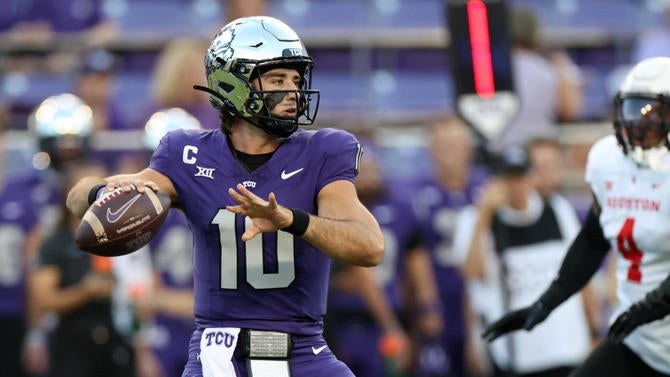
But he's also having to press. Hoover's thrown two interceptions in each of TCU's last three games. All those picks were in situations where TCU either faced a deficit or were tied.
TCU has turned the ball over 14 times this year, which ranks 127th nationally. The Horned Frogs have lost eight fumbles, which is more than any team in the country. The combination of an inability to run and a comically high turnover rate often puts an already stressed defense in short-field situations.
A leaky defense with issues up front
TCU's defense isn't bad on paper. It ranks 39th nationally in yards allowed per play. That's solid. But the underlying metrics are worse.
The Horned Frogs' defensive success rate is just 74th nationally. The biggest reason why? TCU can't stop the run. Opponents are averaging 4.4 yards per carry against TCU, which ranks 85th nationally.
TCU is rarely busting against the pass. But what the Horned Frogs allow with a high frequency are crippling 10- and 20-yard runs that prevent a unit from getting off the field. The Horned Frogs have allowed 38 runs of 10-plus yards and nine of 20-plus. Both stats are near the bottom of the FBS rankings.
That's a problem for a defensive unit that already must play more snaps than most because of TCU's offensive tempo. Thus, the Horned Frogs have one of the lowest time of possessions (102nd nationally) in the FBS.
Beyond stopping the run, the Horned Frogs are also failing to create pressure. TCU ranks just 91st nationally with 10 sacks through six games. This is despite blitzing at a higher than average rate blitz rate (30%) than the rest of the FBS.
These problems mainly stem from an underwhelming defensive line group. That's not all he Horned Frogs' fault. Arguably their top three d-linemen from spring aren't playing right now. One of them, Damonic Williams, transferred to Oklahoma. The other two, Paul Oyewale and Micheal Ibukun-Okeyode, have missed the entire season with an injury.
In addition to the inability to stop the runm TCU fails to create turnovers. The Horned Frogs have forced just four all season; TCU's 2022 team ranked 22nd nationally in total turnovers forced.
To recap: TCU can't stop the run, can't generate consistent pressure and rarely force turnovers. No wonder opponents are averaging 37 points per game against the Horned Frogs.
Almost no high school production from 2020-22 classes ...
TCU signed 51 high school players between the 2020 and 2022 classes. Only 13 of them (25%) remain on the roster. Those players, in their third through fifth seasons, should be the foundation of TCU's team. Instead, most of them aren't even in Fort Worth.
Some of that is obviously due to graduation and departures. Gary Patterson's final class in 2020 featured standouts from TCU's national title run like Quentin Johnston, Kendre Miller and Brandon Coleman. Other very good players from that class left via the portal like Tyler Guyton (a first-round pick for the Cowboys after transferring to Oklahoma), Patrick Jenkins (Tulane) and Khari Coleman (Ole Miss) all departed following Dykes' arrival.
Thus, let's focus on the 2021 and 2022 classes.
TCU hired Dykes just ahead of the 2021 class signing. The 2022 class, which happened during the Horned Frogs' title run, was Dykes' first full group.
The 2021 transition class was a total bust. Only two players from that group remain on the team and only of them, safety Abe Camara, is even part of the rotation.
The 2022 class, which ranked No. 28 nationally, fared better. Half of those 14 players remain on the roster. Of those seven, four are critical starting pieces when healthy.
But if you're TCU, you'd like your would-be juniors on the roster that you recruited to have better than a 29% hit rate. Most good classes need to approach 50% to feel like a success.
Maybe the Horned Frogs would have gotten there if not for the portal. Two of their most promising players from that class, Jordan Hudson (SMU) and Williams (Oklahoma), were both poached off the roster.
No matter the explanation, it's tough for a team to expect consistency when only 25% of their expected upperclassmen remain as part of the team.
... which caused an over-reliance in the portal
You could argue Dykes was the first mover in the portal era. He embraced it early, helping to turn SMU around in short order. His ability to use the portal is a big reason he got the TCU job. That's a tool Patterson generally refused to use.
The Horned Frogs lack upper-level NIL money, but their staff does a very good job identifying value. Overall, 14 of TCU's regular 22 starters are former transfers. That group includes some of the team's best players. Bech (LSU) and McAlister (Boise State) are the two highest-graded players on offense for TCU, per PFF. Starting center James Brockermeyer (Alabama) hasn't allowed a sack this year. TCU is also getting good production from cornerback LaMareon James (Old Dominion) while San Diego State transfer Cooper McDonald has been a real bright spot at edge.
TCU's offensive line would probably look even better, too, if expected starting guard Cade Bennett hadn't missed the whole season thus far with an injury.
The problem is the Horned Frogs had to take 24 transfers this offseason, largely to make up for the combination of misses and departures from their previous high school classes.
Transfers can be great for filling holes. Just look at TCU's 2022 team that made the national title run. But it's hard to consistently win if you're relying on double-digit transfers every season to play big roles. There's just not a lot of margin for error with that type of construction, and TCU is dealing with that this season.
What does the future look like in Fort Worth?
It's going to be an important offseason for TCU. The honeymoon period for Dykes is well in the past, and the Horned Frogs have a lot of lifting to do to mold their roster back into Big 12 title contention. TCU will lose its starting trio of receivers after this season, as well as its best defensive players such as safety Bud Clark and linebacker Johnny Hodges. There are no clear super-duper stars emerging from the 2023 recruiting class, the one signed after the national championship. Same thing with the 2024 freshman class, which only has produced one regular contributor.
Yes, TCU is an old team by design. But a weak farm system bears monitoring going into next year when the Horned Frogs will have to lean on underclassmen as the foundation of their roster.
As for bright spots, the Horned Frogs will return Hoover. He's quietly one of the best quarterbacks in the country. TCU will also benefit more than most from the revenue-sharing era of college athletics. They're already reasonably competitive with NIL, but a full revenue sharing allotment will make them able to attract a different level of recruit or transfer.
Historically speaking, Dykes' staff is recruiting well. They've ranked in the top 34 every season currently and sit at 20th nationally for 2025. If that holds, it'd be the highest-rated class in program history, slightly edging the 2023 class Dykes helped sign. On aggregate high school prospects have never been more bullish on TCU.
The Horned Frogs will also be active in the portal as we've seen in recent years. They'll be swinging big at receivers and linemen on both sides of the ball. They hope to hit a few home runs -- and perhaps they'd better -- because that Fiesta Bowl in in the desert is starting to feel like forever ago.
MORE: Title contenders and tiebreakers in the Big 12 Conference





